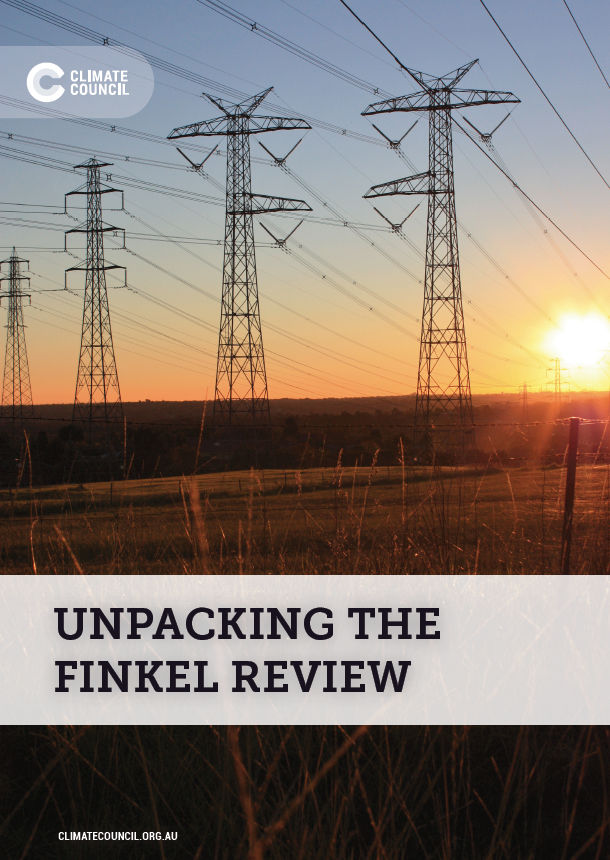The Finkel "Independent Review of the National Electricity Market" has been talked about more times
and by more people than it has been read. Conservative politicians, including Tony Abbott,
and Malcolm Robertson, seem most content to talk about when they haven't read it.
It must be hard to read something you know you are not going to like.
It must be so much easier to get someone else to do the reading and and tell you what to think.
For those on the side of climate change mitigation and having more clean energy supply, their are alternatives to reading Finkel directly by several reviews. For instance I had an easy read of Peter Martin's review in a real newsprint paper, today's Sydney Morning Herald article titled "Finkel Review: A bluffer's guide for those who haven't read it.". Fortunately I have already read and scanned through enough of the original to notice which of my impressions were reinforced. The Climate Council has done some work, for us , by producing a much shorter document called "Unpacking the Finkel Review". Climate Council document link, and a summary of their summary review is here.

Points which come out are :-
The Finkel "Independent" Review ( FIR ) dismisses concerns about total estimated methane leakages from all phases of gas extraction and transport. It also does not seem to worry too much about ongoing extreme gas exploration and extraction involved in fracking, except to recommend adequate compensation arrangements. It ignores the likely rise in social protest at these destructive corporate rip offs. It asserts that gas is a suitable lower carbon emissions replacement for Coal, compared to renewable energy. Everything is seen from the perspective of needs of our current, oil based economy.
The Climate Council review points out that Gas and Coal are equivalently bad, for climate mitigation purposes. Renewable energy targets are just too low, and more so, considering other economic sectors also contribute to our emissions total, such as transport and agriculture. The stationary energy sector is the easiest emissions reduction target to meet, and we are not trying very hard.
The FIR wants to impose dispatch-ability constraints on new clean energy, but not on new fossil fuel power. There is no direct plan for fossil fuel power stations phase out.
This report ignores aspects of our real world that will play an important role over the next 10 - 20 years.
Firstly, by 2036, according to a Michael Mann published study, global warming will be closer to 2 degrees in actuality. Locked in warming, and changes in aerosol effects, mean continued rapid warming. Various extreme weather effects, and pressure on water, agriculture and food, will mean far greater economic and social turmoil than today.
Conventional Cheap oil supply continues to decline at about 5-7% per year. In 10 years the global economy will be running on half as much cheap oil. In 20 years time, one one quarter as much cheap oil. Local and global transport, and all our economies will be in a state of extreme collapse. Coal and Gas are oil transport dependent. We need cheap oil to keep up coal and gas supply. So there will be a gross output fall in fossil energy and carbon emissions. Clean energy equipment, distribution and installation depends on mining, and fossil fuel energy. We will not be doing massive rebuilding our economy as a clean energy economy in the future. Australia will quickly collapse from climate change and economic collapse. In 20 years the global carbon budget for 2 degrees C will be more than used up, yet zero emission target years are placed into the future, well beyond the lifetimes of today's politicians.
All political argument is about "power prices for gas and electricity" and "supply stability" as if nothing else mattered, and nothing else was rapidly changing. This the ultimate, fatal political contempt for the Australian electorate.
The reaction to the Finkel Review, is much more interesting than its crafty political messaging. The political forces continue to block change, and business as usual has nothing much to do with challenges of future reality.
We have perceive techno-utopian civilization, when the global economy is becoming unstable , prone to collapses at the limits to growth. Although technology continues to progress, the entire system is oil-dependent. Various contributors to the Doomstead Diner are becoming despondent or too hopeful. At least human carbon emissions are going to fall anyway, regardless of climate triggers and tipping points that we are setting now.
Add Comment
This policy contains information about your privacy. By posting, you are declaring that you understand this policy:
This policy is subject to change at any time and without notice.
These terms and conditions contain rules about posting comments. By submitting a comment, you are declaring that you agree with these rules:
Failure to comply with these rules may result in being banned from submitting further comments.
These terms and conditions are subject to change at any time and without notice.
Comments